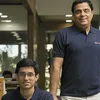Entrepreneurship isn’t a short walk; it’s a long journey: Ronnie Screwvala
Media veteran and serial entrepreneur Ronnie Screwvala tells YourStory why continuous reskilling is now mandatory, how online learning is here to stay, and what entrepreneurs must always keep in mind.
Serial entrepreneur, philanthropist, and media veteran Ronnie Screwvala needs no introduction. But not many know that the ace businessman, who sold UTV to Disney for a billion dollars, tried several businesses before he became a celebrated businessman.
After the UTV sale in 2012, he went on to start up again, launching online education platform with Co-founder Mayank Kumar in July 2015.
Ronnie’s aim is one: building a company that can create impact for 35 million students in higher education and close to 250 million people in the workforce.

Ronnie Screwvala
In a conversation with YourStory, on the publications Instagram handle, he says he was “opportunistic and impulsive” in his younger days, and that was “a good thing” because as an entrepreneur he “got four things wrong and six things right”.
He feels an entrepreneur should never be held back by mistakes as that won’t help him or her progress. Failures matter because the learnings lead to success later. He adds that an entrepreneur should be self-confident and have self-conviction, but“not ego”, which is “a waste of time”.
Edited excerpts of the interview:
YourStory: The coronavirus pandemic has led to an unprecedented surge in online learning. Is it here to stay?
Ronnie Screwvala: We have crossed five lakh learners in less than five years and it has been a great journey for online learning. The pandemic has helped people evolve; online learning and edtech have arrived.
We had a fair share of concept selling and hard selling, but did not really know if corporates and universities were accepting online. But, over the last two months, we have seen that online learning is here to stay. Online learning, apart from beaming a lecture, must be combined with grading and mentoring.
We knew that there was a huge opportunity. There are close to a billion people in the workforce, and we went after 25 percent of them - 12th pass, undergraduates, and graduates. Many of them have been at work for five years, and feel confident that they could do something more. Lifelong learning is now the norm.
A lot of universities and colleges are proactive in this journey. After the COVID-19 situation, a lot of corporates and universities are telling their employees and students to reskill themselves. COVID-19 will shrink the workforce, but it is the job of businesses to help employees stay relevant.
YS: How do you compare to these massively open online courses (MOOCs)? Do you feel an MBA is relevant?
RS: Learning is not about consuming content like one does on YouTube. There are fantastic platforms to consume content, but learning is an experience. There has to be a completion rate to categorise it as learning. We have an 85 percent completion rate or more.
With MOOCs, the completion rates are very low. That is why we need mentors and counsellors. Peer-to-peer learning is exciting because of collaboration, and we have over 750 students in a class. You may think people don’t pay attention, but the fact that they are completing their courses shows how learning needs to be about experience and mentoring.
When it comes to an MBA, I always admit that I have a bachelor’s in commerce degree and ran away from doing a chartered accountancy or an MBA.
However, an MBA is evergreen for people keen to do or understand business. That said, I believe MBA programmes won’t be two years long anymore. They will be shorter and more focused; for example, we have the Business Analytics course, which is a three-month certification programme.
The beauty of the online model is that it works especially well if you missed graduating because you started working and then feel you are too old to sit in a class. There is also an emerging hybrid modelwhere you go to college for a few months and finish the rest of the classes online. Also, the opportunity is huge for those who could go to the top 34 universities; they can continue to work and get the best education online.
The future of learning is data. For example, a doctor need not be good at data science, but can learn how to use it to make an impact on the medical profession.
YS: Do you think reskilling, employment and employability and the future of entrepreneurs are connected in any way?
RS: Do I need a degree and do I need to reskill? These are two separate things and they are not connected. You need a degree if you are pursuing a job. You need to reskill to be relevant in the workforce.
As an entrepreneur, learning is a must. A founder may be great at finance, but not at marketing. Every individual will decide what s/he wants to learn. Being smart involves quite a few things; it needs a holistic view anda level of confidence and a level of self-belief.
There is a lot of focus on skilling. For a country like India, skilling 100 million people has no connection with jobs. In the end, those jobs need to be created. Earlier, jobs were provided by mom-and-pop retailers.
Now, the basic responsibility will fall on entrepreneurs. They need to create at least 100 jobs per company. We need a million entrepreneurs, but only 1,844 companies were registered last year.
Why can’t we have a million entrepreneurs who can create jobs? Today it is much easier to startup because there is information and funding.
I never grew up with the entitlement that I could raise money as soon as I started up. I had to build the business on my own. Today, that is not the case. But, funding is not your birthright. It is not the first round of funding that will be difficult; the third round will be.
YS: What entrepreneurship advice do you have for young people?
RS: When I started, it took me six years before my business started settling. I built a B2B business and had to negotiate to keep clients. After that, I launched a B2C business.
I tell young entrepreneurs not to act entitled when it comes to money.
I have met a lot of people in their mid-thirties and mid-forties who want to “try” entrepreneurship. I tell them not to think about trying because it is not like going out for a short walk; entrepreneurship is a long journey. You will fail 100 percent if you think two years will help you succeed as an entrepreneur.
You have to stick with your beliefs and need to time things right. You need to create impact with scale; just impact is not enough.
Edited by Teja Lele









